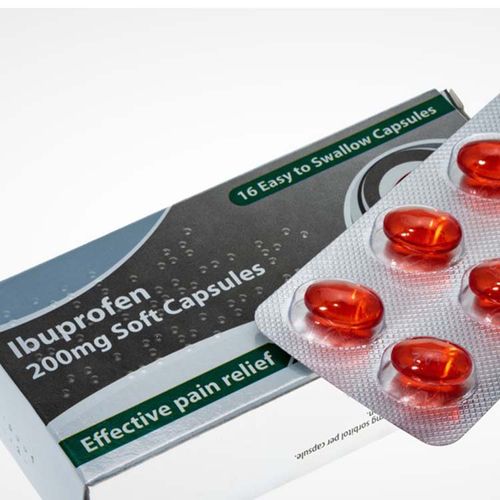Americans seeking safe, effective pain relief may have another class of medications to worry about-non-steroidal anti-inflammatory drugs (NSAIDs). Research on Norwegian smokers found that long-term use of certain over-the-counter (OTC) painkillers (aspirin, Advil, Motrin or Aleve) may raise the risks for heart attack and stroke.
But as the dust settles, a number of experts say the findings raise more questions than they answer—and are certainly no reason for anyone to toss these drugs out of the medicine cabinet.
The Study
Co-researcher Dr. Andrew Dannenberg and his colleagues in Norway didn't set out to ascertain the cardiovascular risks of NSAIDs. "The purpose of our study was to evaluate individuals who utilized traditional NSAIDs, and see whether or not they were protected against developing tobacco-smoke-induced oral cancers," he says.
In fact, their study of 908 Norwegian smokers found that daily use of non-Cox-2 NSAIDs, such as aspirin, ibuprofen (Advil, Motrin) or naproxen (Aleve), for more than six months did cut the risk for oral cancer by approximately two-thirds, compared with people who did not use these drugs.
"However, we also noticed that despite the reduced risk of oral cavity cancer, there was no obvious prolongation of life in this NSAID using group, Dannenberg says. "That was puzzling."
Digging deeper, the researchers discovered that long-term NSAID users faced twice the risk of dying from heart-related problems, compared with participants who took acetaminopben (Tylenol), a non-NSAID pain reliever.
"These data suggest that the increase in cardiovascular risk observed with selective Cox-2 inhibitors like Vioxx or Bextra is not unique, but rather extends to traditionally used NSAIDs" such as ibuprofen and naproxen, Dannenberg reports.
The Caveats
Yet Dannenberg cautions, "This is a small, retrospective study, and it needs to be judged with that in mind, rather than making sweeping recommendations."
In retrospective studies, scientists analyze old data, looking for patterns. These types of studies are not as reliable as prospective trials, where researchers are able to control and record events as they unfold.
In addition, because all the patients were smokers, they were "presumably high-risk individuals for cardiovascular disease already," he explains. "These results might not extend to nonsmokers."
Other experts agree the study has serious limitations.
"People who tend to be on long-term painkillers often have other diseases and problems that might increase their risk for vascular disease," says Dr. Philip Greenland, a spokesman for the American Heart Association (AHA) and a co-author of the AHA's recently released guidelines on NSAID use. "So, is it any great surprise that people who are on these drugs are also at higher risk [for heart disease and stroke) than people who aren't?"
Greenland also notes that Dannenberg's study reports a slight increase in cardiovascular risk for aspirin users—a finding that flies in the face of much larger, better-controlled trials suggesting that aspirin protects the heart.
Dr. Mark Fendrick, a professor of internal medicine at the University of Michigan and an expert on NSAID use, says consumers also need to understand that even a doubling of risk might not amount to much. "The (relative) cardiovascular risk in the Norwegian study might have been doubled, but that might mean it doubled from 1-in-1,000 to 2-in-1,000," he notes.
The Advice
"Right now, long-term, placebo-controlled trials the gold standard-are simply not available to medically assess the potential for traditional NSAIDs to increase the risk of adverse cardiovascular events," says Greenland, chairman of the department of preventive medicine at Northwestern University's Feinberg School of Medicine in Chicago.
"No one has reported that short-term use of these medications has ever been associated with any adverse outcomes," he adds. As for long-term use-typically meaning more than a week or two-"to be on the safe side, people should try to be on the lowest dose possible and they should not take any drug over the long term unless they absolutely need it. Of course, those are all instructions that have already been on drug labeling for a long time."
Generic Has Fewer Complications than Aleve
A generic version of the nonsteroidal antiH inflammatory drug (NSAID) etodolac caused 60% fewer gastrointestinal ulcer complications than the over-the-counter painkiller naproxen (Aleve) in a study by Texas researchers.
"Since etodolac is available as generic medicine, as much as an 80% cost savings can be achieved if patients were to use it rather than branded medications such as Celebrex," says study author Dr. Byron Cryer, an associate professor of internal medicine at the University of Texas Southwestern Medical Center and the Dallas Veterans Affairs Medical Center.
The Study
For the study, more than 16,000 patients took either etodolac or naproxen over three years. The researchers found that the decrease in ulcer complications in patients taking etodolac was similar to or even better than what was seen in earlier studies of patients taking brandname NSAIDs such as Celebrex and Vioxx, known to cause less GI distress. However, Vioxx has been pulled from the market by its manufacturer because of concerns about side effects such as heart attacks.
"In the 13 years of etodolac's use in the United States, there have been no reports of increases in cardiovascular events associated with the drug," Cryer notes.
